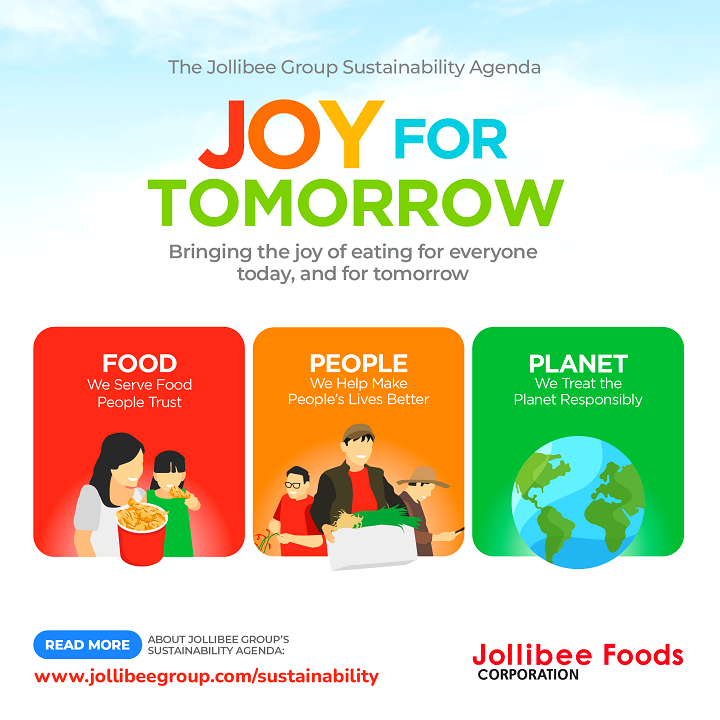
The Jollibee Group launched last March 16 its Global Sustainability Agenda dubbed Joy for Tomorrow, which aims to further strengthen the company’s commitment to sustainable business practices.
While Jollibee Group has made significant strides over its 45-year history in various social and environmental projects, it is now purposely integrating all its sustainability efforts into a more cohesive framework that unites the Jollibee Group community, including employees, business partners, suppliers, vendors, and other stakeholders, toward a set of shared sustainability goals.
With Joy for Tomorrow, Jollibee Group stays true to its mission of bringing the joy of eating to everyone, acknowledging that this mission extends not only to its customers and stakeholders today, but also to future generations. The company recognizes that it must use its global scale, resources, and expertise to help usher in a more sustainable future for society and the planet.
“Our challenge in Jollibee Group is how to sustain our success while creating a positive impact on our society and planet. As one of the fastest growing restaurant companies in the world, and with our vision to become one of the top companies in our industry, we recognize that we have a significant role and responsibility in impacting positive change,” said Jollibee Group President and CEO Ernesto Tanmantiong.
The Joy for Tomorrow Sustainability Agenda centers on three pillars namely Food, People, and Planet. These pillars consist of 10 focus areas: Food Safety, Food Quality, Nutrition & Transparency, Employee Welfare, Farmers Livelihood, Community Support, Good Governance, Packaging & Recycling, Waste Reduction, and Energy & Water Efficiency. Each focus area sets goals and initiatives that contribute and align to the United Nations Sustainable Development Goals (UN SDGs).
According to Jollibee Group Chief Sustainability and Public Affairs Officer Pepot Miñana, Joy for Tomorrow serves as the company’s roadmap for achieving the triple bottom line of people, planet, and profit.
“It’s a call to action for everyone in Jollibee Group, amid the pursuit of our sustainability pillars of Food, People, and Planet. It is our commitment to future generations to preserve and improve natural resources from which they can benefit,” Miñana said.
Serving food that people trust
Jollibee Group prioritizes food safety and quality to maintain the trust of its customers worldwide.
In 2022, the company conducted over 15,000 Food, Service, and Cleanliness (FSC) Audits across its stores worldwide, while over 125,600 online training hours were devoted to Food, Service, Cleanliness & Condition. Moreover, 100% of its stores, commissaries, and logistics facilities have undergone rigorous Quality Management audits. The group also achieved a global Net Promoter Score of 82, exceeding industry benchmark of 50, showcasing customer satisfaction and loyalty for the various brands.
Helping make people’s lives better
Jollibee Group recognizes the invaluable role in fostering an inclusive work environment for its employees, partners, farmers, and communities.
In 2022, women made up 59% of management positions and 51% of the total workforce. Through training courses on Unconscious Bias, Inclusive Leadership, and Anti-Discrimination, the company educates its employees on the value and benefits of a diverse and inclusive workplace. As a measure of high employee engagement, the group achieved the 70th percentile of Gallup’s Q12 percentile ranking.
Outside of the organization, Jollibee Group Foundation’s Farmer Entrepreneurship Program (FEP) has enabled over 700 smallholder farmers across the Philippines to deliver their produce directly to Jollibee Group. Today, the white onions, green bell peppers, tomatoes, calamansi, ginger, and other vegetables that the company uses in Jollibee, Chowking, Greenwich, and Mang Inasal products come from FEP farmers.
Treating the planet responsibly
In terms of environmental sustainability, Jollibee Group focuses on the key areas of packaging and recycling, energy, water, and waste.
By the end of 2022, Jollibee Group manufacturing sites in the Philippines achieved 21% reduction in energy use ratio, 23% reduction in water use ratio, and 38% reduction of waste, with almost 50% of waste now being recycled versus the company’s 2020 benchmarks. On the store level, each solar panel installed reduces about 3-7% of consumption form the grid.
Progress over perfection
“We understand that assessing our impact is a continuous process of ambition and refinement. We will track the success of our strategies over the coming years, and periodically review our material topics and stakeholder engagement process. We will set agile goals and targets to help us significantly impact society and the environment in more meaningful ways,” Tanmantiong said.
Apart from establishing a unit dedicated to sustainability and the appointment of a Chief Sustainability Officer as part of its Executive Team, Jollibee Group also instituted an Environmental, Social, and Governance (ESG) Council to ensure that its business operations are aligned with the sustainability goals.
“Our Global Sustainability Agenda represents our belief system in conducting business more ethically. As a global food company, we are responsible and deliberate with our actions and their impact, and we are making our sustainability measures the way of the future,” added Miñana.

